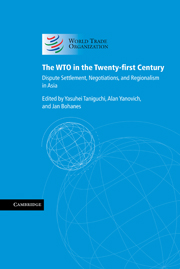Book contents
- Frontmatter
- Contents
- Notes on contributors
- Acknowledgements
- Table of dispute settlement cases and reports
- List of abbreviations
- Introduction
- PART I The WTO at Ten
- PART II Accomplishments and Future Prospects of the WTO Dispute Settlement System
- 3 The WTO dispute settlement system after ten years: the first decade's promises and challenges
- 4 WTO dispute settlement practice 1995–2005: lessons from the past and future challenges
- 5 Evaluating WTO dispute settlement: what results have been achieved through consultations and implementation of panel reports?
- 6 The responsibilities of a WTO Member found to have violated WTO law
- 7 ‘Public–private partnerships’ in WTO dispute settlement: the US and EU experience
- 8 Accomplishments of the WTO dispute settlement mechanism
- 9 Arbitration as an alternative to litigation in the WTO: observations in the light of the 2005 banana tariff arbitrations
- 10 The evolving WTO dispute settlement system
- PART III Asian Perspectives on WTO Dispute Settlement
- PART IV The Doha Development Agenda and Beyond
- PART V Asian Regional Integration and the Multilateral Trading System
- Index
7 - ‘Public–private partnerships’ in WTO dispute settlement: the US and EU experience
from PART II - Accomplishments and Future Prospects of the WTO Dispute Settlement System
Published online by Cambridge University Press: 05 March 2012
- Frontmatter
- Contents
- Notes on contributors
- Acknowledgements
- Table of dispute settlement cases and reports
- List of abbreviations
- Introduction
- PART I The WTO at Ten
- PART II Accomplishments and Future Prospects of the WTO Dispute Settlement System
- 3 The WTO dispute settlement system after ten years: the first decade's promises and challenges
- 4 WTO dispute settlement practice 1995–2005: lessons from the past and future challenges
- 5 Evaluating WTO dispute settlement: what results have been achieved through consultations and implementation of panel reports?
- 6 The responsibilities of a WTO Member found to have violated WTO law
- 7 ‘Public–private partnerships’ in WTO dispute settlement: the US and EU experience
- 8 Accomplishments of the WTO dispute settlement mechanism
- 9 Arbitration as an alternative to litigation in the WTO: observations in the light of the 2005 banana tariff arbitrations
- 10 The evolving WTO dispute settlement system
- PART III Asian Perspectives on WTO Dispute Settlement
- PART IV The Doha Development Agenda and Beyond
- PART V Asian Regional Integration and the Multilateral Trading System
- Index
Summary
The blurring of the public and the private in international trade law
Law's rising prominence in international economic relations is nowhere seen more clearly than in the realm of international trade law following the creation of the World Trade Organization (WTO) on 1 January 1995. WTO law consists of rules that a centralized institution, the WTO Dispute Settlement Body (DSB), enforces through adopting judicial judgments that, if not complied with, trigger sanctions. While the WTO lacks police power, WTO judicial bodies have the power to authorize a winning party to withdraw trade concessions against a losing party who does not comply with the judgment. All states, even the most powerful states, have responded to WTO judgments by modifying domestic regulations and practices, or, in the few cases where domestic politics blocked modification, accepted any resulting sanctions. In the first eleven years following the WTO's formation, 335 formal complaints were filed, resulting in 95 adopted panel and Appellate Body reports and numerous settlements, with 20 panels pending.2 International trading relations have been governed increasingly through law – or better stated, through power mediated by law – with the great powers and developing countries increasingly initiating legal complaints between and among each other.
The blurring of the public and the private spurs the growth of international economic law. WTO law, while formally a domain of public international law, profits and prejudices private parties. As international economic relations become legalized, lawyers listen and market their wares. Private parties, in particular well-connected, wealthier and betterorganized ones, attempt to use the WTO legal system to advance their commercial ambitions.
Information
- Type
- Chapter
- Information
- The WTO in the Twenty-first CenturyDispute Settlement, Negotiations, and Regionalism in Asia, pp. 148 - 184Publisher: Cambridge University PressPrint publication year: 2007
